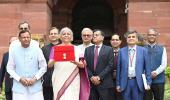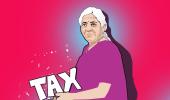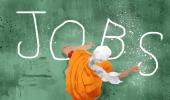'Union Budgets are often used as political instruments and that was the intention of this government too.'
'But while the exercise has settled two fronts, it has left open several others and this has the potential to aggravate with time,' predicts Nilanjan Mukhopadhyay.

Two hundred and ninety three is a prime or indivisible number. But when this number is placed as the National Democratic Alliance's tally in the Lok Sabha, it does not have the characteristic of a number that cannot be divided.
When this figure ended up as the final mark of the alliance on the scorecard of Verdict '24, it was evident that its value is not only much less than the 400 paar mark that Narendra Modi aspired for, but even lower than a total which would make the coalition's largest partner, the Bharatiya Janata Party, breathe easy.
This burden of having a count within the Lower House that is mathematically indivisible, but in the world of realpolitik, extremely breakable, was palpable time and again in the Union Budget of 2024-2025, presented by Finance Minister Nirmala Sitharaman last week.

The first Budget of what has been wrongly labeled by sections of the media -- driven by the objective to affix smart labels in order to overcome deficiencies of content -- as Modi 3.0 (even the prime minister in his 'victory' speech on June 4 referred to his new regime as 'NDA Government'), was given the apt title of 'kursi bachao Budget (save the chair Budget)' by Rahul Gandhi, fast becoming more precise in his choice of words and phrases with every occasion.
This Budget's primary objective was to present new big ideas, bold reforms, a road map for the next five years. This was not a demanding expectation from a government in its third term, when its performance ideally, should surpass that of previous terms.
It cannot be obfuscated that the message broadcast after government formation was that 'continuity' was the underlining theme of the exercise with most senior ministers continuing with their old jobs.
On the contrary, the sole purpose of Sitharaman's exercise was to ensure that at least for the moment, the BJP's two biggest allies -- the Telugu Desam Party led by N Chandrababu Naidu and the Nitish Kumar-led Janata Dal-United -- did not rock the coalition's boat after being gratified by Sitharaman's offerings for their states.
Ironically, the NDA government chose to deny the designation of special category status for the two states by unearthing a 2012 Finance Commission report from the Congress party-led United Progressive government.
Over the past decade ever since Modi became prime minister, he lost no opportunity in depicting the ten-year period from 2004 till the start of his tenure as a wasted decade.

Naidu expressed gratitude for the Rs 15,000 crore budgetary support for the capital city, the full commitment to the Polavaram project and the development of industrial nodes, besides backward areas.
Nitish Kumar's response was more cryptic. He accepted that the grant of Rs 26,000 crore towards the development of road projects, Rs 21,400 crore for power projects and another Rs 11,500 crore towards irrigation projects to manage the flood prone areas.
He stated that these addressed the state's fiscal concern, but remained non-committal when asked if the demand for Special Status would be reiterated later.
Clearly, while Naidu has assumed the mantle of chief minister after a virtual electoral sweep of the state and has to begin delivering on promises before anti-incumbent sentiment sets in, the Bihar CM knows that with the majority of people going chiefly with the 'feel-good' sense of the label of 'Special Status', it can once again be an effective issue to be raised next year prior to when the state faces elections in October next year.

For the moment however, Sitharaman appears to have ensured that the twin pack of 28 MPs from the TDP and JD-U will not threaten to part over demands not being met. But in the process of assuaging these states, the BJP has ended up leaving its own supporters in other states, those governed by the BJP as well as the ones ruled by the Opposition parties, unhappy.
So far the anger has been voiced solely by non-BJP CMs, but as the verdict of the Lok Sabha polls demonstrated, electoral choices are once again being made in several states on the basis of non-emotive and non-civilisational issues and this was principally went against the BJP in this year's polls.
As a consequence, although the BJP performed creditably in Karnataka and Telangana, winning one seat for the first time even in Kerala, the non-allocation of anything more than the routine in the Budget will certainly be leveraged to its benefit by the Congress in the two states.
Similarly, the Biju Janata Dal in Odisha, which has switched sides in the Rajya Sabha, where its presence has not been wiped out as in the Lower House, will try to use this 'denial' as an instrument to begin the long process of political comeback.
A slightly different situation prevails in West Bengal where the Trinamool Congress considerably improved its performance.
The inability of the Centre to create a wedge in the Opposition despite Mamata Banerjee not joining the INDIA Bloc in staying away from the Niti Aayog meeting, and instead raking hostility will once again threaten the so far cordial discussion over the Budget in Parliament.

Clearly, Modi and ministers are failing to display the skills required to run a government which does not have past comfort of numbers on its side.
Further, the BJP faces the danger of angering people in Maharashtra, Jharkhand and Haryana which go in for Vidhan Sabha elections later this year.
Aware that the finance minister would not offer anything special for the state, the Maharashtra government with the BJP as a key coalition partner has already offered largesse to people in the state budget.
Aware that it is easier to generate people's sympathy in economically troubled or unsure times by campaigning that their interests were jettisoned over that of people from other states, Opposition Maharashtra Vikas Aghadi leaders have mounted a strident assault on the BJP and its allies.
Elections are also due in Delhi before the third week of February 2025.
It is also two months since the Lok Sabha verdict was declared and the BJP lost its majority and Modi was forced to form a coalition government which was not one in name only like his previous two regimes.
Quite clearly, the two largest allies that joined the bandwagon had done tough bargaining before agreeing to not just join the government but also not flexing their political muscles during portfolio allocation.
The primary handicap is that Modi does not have the experience with working with other people, having always had an overwhelming legislative majority, in the Gujarat assembly, as well as in the Lok Sabha.
The art of running coalitions is not easy to pick up and it took even the more amenable Atal Bihari Vajpayee well over a year before he learnt the tricks and completed his tenure in his third innings as prime minister.
Union Budgets are often used as political instruments and that was the intention of this government too. But while the exercise has settled two fronts, it has left open several others and this has the potential to aggravate with time and developments.
Already the reactions in the wake of the Uttar Pradesh government's order on the Kanwar Yatra route saw three coalition partners voicing opposition on a Hindutva-promoting decision.
The prime minister needs to ensure that his team, he included, learn the art of tight-rope walking.
Nilanjan Mukhopadhyay is an author and journalist based in Delhi-NCR.
His latest book is The Demolition, The Verdict and The Temple: The Definitive Book on the Ram Mandir Project.
He is also the author of Narendra Modi: The Man, The Times.
Feature Presentation: Rajesh Alva/Rediff.com











 © 2025
© 2025